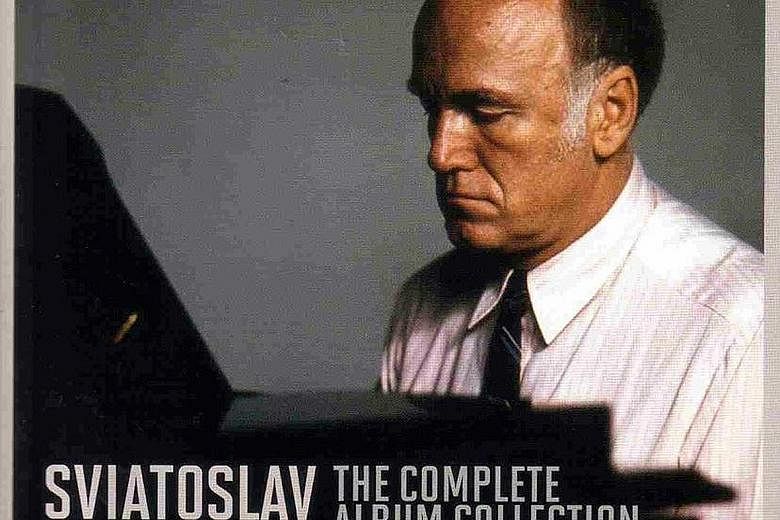NEW YORK • After Stalin's death in 1953, the Soviet Union lifted a bit of the Iron Curtain to allow some major Russian artists to make debuts in America. Among them were violinist David Oistrakh and pianist Emil Gilels, both in 1955. Notably missing was pianist Sviatoslav Richter, whose performances combined stunning technique, myriad colourings and fierce integrity.
Every time Gilels was lavished with praise in America, he would offer thanks, then add: "Wait until you hear Richter."
In 1960, Richter was finally sanctioned by Soviet officialdom to make a North American tour. But if you take at face value some comments that this intensely private pianist made during Richter The Enigma, a 1998 documentary by French film-maker Bruno Monsaingeon, he never wanted to undertake this tour at all.
"I was forced to go," Richter, whose centennial is this year, says at one point. But who forced him? We never find out.
Richter, who died at 82 in 1997, disliked travelling and hated airplanes. As the tour approached, he grew ill and depressed. Setting out for the journey, he almost went to the wrong station and missed his train, he told Monsaingeon. "I wish I had missed it," he added.
But with a Soviet "minder" tagging along, Richter, then 45 and in his prime, made that tour to the United States and Canada, playing about 30 concerts over three months in 1960. American music lovers who knew of him as a legend finally heard him live.
His American debut took place in Chicago on Oct 15 when he performed Brahms' Second Piano Concerto with the Chicago Symphony Orchestra. The performance was a sensation. Two days later, everyone reassembled to record the concerto for RCA.
To celebrate the Richter anniversary, Sony Classical has released an 18-disc box set of all his live and studio recordings for RCA and Columbia, newly remastered. The collection goes from that 1960 Brahms Second through two discs of live recordings Richter made in 1988 at the Schleswig-Holstein Festival in Germany, including Beethoven's First Piano Concerto with Christoph Eschenbach and the festival orchestra.
The Richter/Chicago Brahms Second Concerto is one of the greatest recordings of the century. The liner notes by Claudia Cassidy, at the time the music critic of the Chicago Tribune, describe the performance as "the Brahms Second of a listening lifetime".
In his revealing, sometimes exasperating film, Monsaingeon milks the mystique of Richter as an enigma, relying on archival footage, performances and interviews.
In the opening sequence, as Richter plays the slow movement of Schubert's late Sonata in B Flat, text appears: "Richter is a world unto himself, impenetrable yet radiant; a deepwater fish, blind but luminous." Come now.
Although Richter sometimes speaks with disarming frankness, the film fails to clear up his many guarded recollections of crucial events in his life, including his German expatriate father's arrest and execution for suspected espionage in 1941. Richter's mother, involved at the time with the man who would become her second husband, refused to leave and flee with the family to safety. Richter's account is extremely confusing.
Still, the film suggests that as a person, and in the conflicted way he handled his career, Richter was a bundle of contradictions.
He decided on the piano relatively late and never considered himself a prodigy. As a teenager, he found jobs playing in factories and nursing homes and became a coach at the local opera and ballet. When he auditioned at Moscow Conservatory for pianist Heinrich Neuhaus, who would become his most influential teacher, Neuhaus was deeply impressed and whispered to a student that he thought young Richter a "musician of genius".
If Richter was an enigmatic man, his playing was anything but. Whether charging through Pro- kofiev sonatas, exploring the fantastical realms of Schumann's piano pieces or playing Debussy with ravishing delicacy, he makes every element of a performance purposeful.
In a 1996 review in The New York Times of a 10-disc set of Richter recordings for Melodiya, a Russian label, critic Bernard Holland wrote that authority rises around the pianist's performances "like great stone monuments". Richter, he added, "does not interpret a piece of music; he looms over it".
I know what bothers Holland: Richter is the definition of a formidable pianist, for better or worse.
In 2010, Richter's secretive side was explored in a well-received biography by Danish composer and writer Karl Aage Rasmussen.
One subject he explores is Richter's long-rumoured homosexuality. In the mid-1940s, Richter met Nina Dorliak, a singer who became a frequent recital partner, as well as his lifelong companion. It was thought that the couple married in 1946; this turns out not to be so. One can imagine what it must have been like for Richter to disguise male sexual attractions at a time when such behaviour could be criminal in the Soviet Union.
Still, affirming scenes in Richter The Enigma show the couple greeting guests for holiday gatherings and playing music with friends for fun. He clearly made the accommodations he had to.
Speaking of accommodations, listeners to these reissued recording will have to make some to the variable audio quality in several of the live performances, especially the 1960 Carnegie Hall recitals. But it truly does not matter.
The milky hues and warmth of Richter's sound in Debussy's Images come through miraculously. At the other extreme is his brash, incisive account of Prokofiev's Sonata No. 6 - brutal, percussive, yet triumphantly pianistic. The restless, scurrying finale, which usually sounds like madcap music for a silent movie, comes across like the soundtrack to a demented cartoon. Yet every note is audible under his control.
Richter an enigma? Not when he played the piano. NEW YORK TIMES

